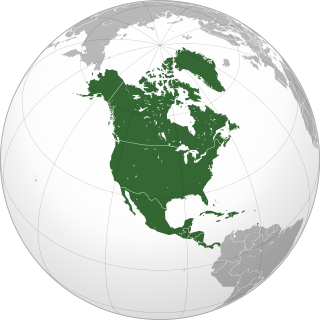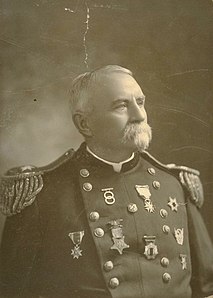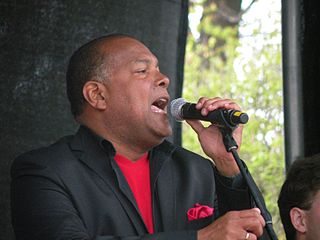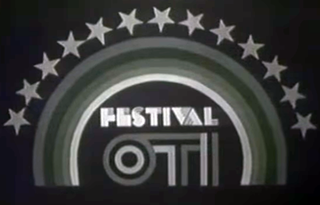
North America is a continent in the Northern Hemisphere and almost entirely within the Western Hemisphere. It can also be described as the northern subcontinent of a single continent, America. It is bordered to the north by the Arctic Ocean, to the east by the Atlantic Ocean, to the southeast by South America and the Caribbean Sea, and to the west and south by the Pacific Ocean. Because it is on the North American Tectonic Plate, Greenland is included as part of North America geographically.

The Philippine–American War or the Filipino–American War, previously referred to as the Philippine Insurrection or the Tagalog Insurgency by the United States, was an armed conflict between the First Philippine Republic and the United States that lasted from February 4, 1899, to July 2, 1902. While Filipino nationalists viewed the conflict as a continuation of the struggle for independence that began in 1896 with the Philippine Revolution against Spain, the U.S. government regarded it as an insurrection. The conflict arose when the First Philippine Republic objected to the terms of the Treaty of Paris under which the United States took possession of the Philippines from Spain, ending the Spanish–American War.

Harrison Gray Otis was the president and general manager of the Times-Mirror Company, publisher of the Los Angeles Times.

Ibero-America or Iberian America is a region in the Americas comprising countries or territories where Spanish or Portuguese are predominant languages. Portugal and Spain are themselves included in some definitions, such as that of the Ibero-American Summit and the Organization of Ibero-American States. The Organization of Ibero-American States also includes Spanish-speaking Equatorial Guinea, in Central Africa, but not the Portuguese-speaking African countries.

Dave Benton is a pop musician from Aruba who lives in Estonia. He is one of the winners of the Eurovision Song Contest 2001. At the age of 50 years and 101 days at the time of his victory, Benton is the oldest singer ever to win Eurovision.

Canada competed at the 1936 Summer Olympics in Berlin, Germany. 97 competitors, 79 men and 18 women, took part in 69 events in 12 sports.
"Try a Little Tenderness" is a song written by Jimmy Campbell, Reg Connelly, and Harry M. Woods. It was first recorded on December 8, 1932, by the Ray Noble Orchestra. Another version, also recorded in 1932 was made by Charlie Palloy & his Orchestra. (Ted Lewis and Ruth Etting had hits with it in 1933. Bing Crosby also recorded it on January 9, 1933 for Brunswick Records. A version by Bob and Alf Pearson was also released in 1933.

OTI Festival was an annual singing competition, held between 1972 and 2000 among active member countries of the Organización de Televisión Iberoamericana (OTI). It was preceded in 1969 and 1970 by the Festival Mundial de la Canción Latina, held in Mexico.
Augusto Algueró Dasca was a Spanish composer, arranger and music director. He wrote more than 500 songs and about 200 musical scores for films and television.

The United States Military Government of the Philippine Islands was a military government in the Philippines established by the United States on August 14, 1898, a day after the capture of Manila, with General Wesley Merritt acting as military governor. During military rule (1898–1902), the U.S. military commander governed the Philippines under the authority of the U.S. president as Commander-in-Chief of the United States Armed Forces. After the appointment of a civil Governor-General, the procedure developed that as parts of the country were pacified and placed firmly under American control, responsibility for the area would be passed to the civilian.
Beau Ideal is a 1927 novel by P. C. Wren. It was the second sequel to his 1924 novel Beau Geste.

Spain and its OTI member station RTVE was one of the founding members of the OTI Festival and debuted in the event in 1972 in Madrid, being the host broadcaster of the first show. The Spanish participation in the song contest was almost uninterrupted, in fact, RTVE only withdrew from the contest in the edition of 1986, which was held in Santiago, as a protest against the Augusto Pinochet dictatorship.

Univision, formerly SIN, the biggest Spanish speaking TV channel of the US, was the OTI member station that organised the American participation in the OTI Festival. The network, whose main audience was the Spanish speaking community of the United States, debuted in the contest in 1974 in Acapulco with Rosita Perú and her song "Pero...mi tierra", which ended in the 17th place. Although the American broadcaster withdrawed from the event some years after its debut, Univision returned to the event and participated till the last edition in 2000 which was held again in Acapulco.

The OTI Festival 1972 was the very first edition of the annual OTI Festival and was held in Madrid, Spain. Organised by the Organización de Televisión Iberoamericana (OTI) and host broadcaster Televisión Española (TVE), the contest was held at the Palacio de Exposiciones y Congresos auditorium on Saturday 25 November 1972 and was hosted by Rosa María Mateo and Raúl Matas.

The OTI Festival 1973 was the second edition of the annual OTI Festival. It was held in Belo Horizonte, Brazil, following the country's victory at the 1972 contest with the song "Dialogo" by Claudia Regina and Tobías. Organised by the Organización de Televisión Iberoamericana (OTI) and host broadcaster Rede Tupi, the contest was held at the Palácio das Artes on Saturday 10 November 1973 and was hosted by Walter Forster and Íris Lettieri.

OTI Festival 1974 was the third edition of the annual OTI Festival. It was held in Acapulco, Mexico, following the country's victory at the 1973 contest with the song "Que alegre va María" by Imelda Miller. Organised by the Organización de Televisión Iberoamericana (OTI) and host broadcaster Televisa, the contest was held at the Ruiz de Alarcón Theatre on Saturday 26 October 1974 and was hosted by Raul Velasco and Lolita Ayala.

The OTI Festival 1975 was the fourth edition of the annual OTI Festival. It took place in San Juan, Puerto Rico, following the country's victory at the 1974 contest with the song "Hoy canto por cantar" by Nydia Caro. Organised by the Organización de Televisión Iberoamericana (OTI) and host broadcaster Telemundo, the contest was held at Telemundo television studios on Saturday 15 November 1975 and was hosted by Marisol Malaret and Eddie Miró.

The OTI Festival 1976 is the fifth edition of the annual OTI Festival. It took place in Acapulco, Mexico, following the country's victory at the 1975 contest with the song "La felicidad" by Gualberto Castro. Organised by the Organización de Televisión Iberoamericana (OTI) and host broadcaster Televisa, the contest was held at the Ruiz de Alarcon Theatre on Saturday 30 October 1976 and was hosted by Raúl Velasco and Susana Dosamantes. It was the second time that Raúl Velasco had hosted the event, as he also hosted the 1974 contest at the same venue, making him the first person to host the contest twice.

The OTI Festival 1978 was the seventh edition of the annual OTI Festival. It was held in Santiago, Chile, who offered itself to to stage the event after Nicaragua, who won the 1977 contest, was unable to organize it due the outbreak of the Nicaraguan Revolution. Organised by the Organización de Televisión Iberoamericana (OTI) and host broadcasters Televisión Nacional de Chile, Canal 13, UCV Televisión and Canal 9, the contest was held at the Municipal Theatre of Santiago on Saturday 2 December 1978 and was hosted by Raquel Argandoña and Raúl Matas. Matas had previously presented the inaugural OTI Festival back in 1972 in Madrid.
The OTI Festival 1980 was the ninth edition of the annual OTI Festival. It was held in Buenos Aires, Argentina, following the country's victory at the 1979 contest with the song "Cuenta conmigo" by Daniel Ríolobos. Organised by the Organización de Televisión Iberoamericana (OTI) and host broadcasters Canal 7 and Canal 13, the contest was held at the 1049-seat Martín Coronado room of the Teatro General San Martín on Saturday 15 November 1980 and was hosted by Antonio Carrizo and Liliana López Foresi.
















